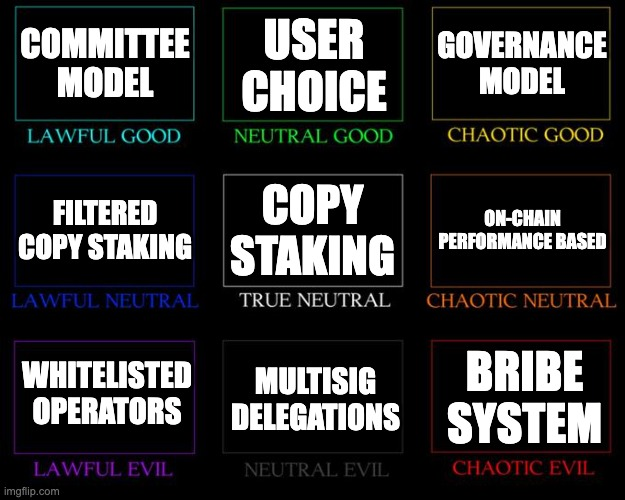No objections to adding these!
Opened a PR here [CIP-14] Add FeeGrants msgs to AllowMessages by asalzmann · Pull Request #110 · celestiaorg/CIPs · GitHub @agouin
No objections to adding these!
Opened a PR here [CIP-14] Add FeeGrants msgs to AllowMessages by asalzmann · Pull Request #110 · celestiaorg/CIPs · GitHub @agouin
same, no objections and great to see ICA host getting used for multiple use cases
Thanks @nashqueue for bumping this on X https://twitter.com/NashQueue/status/1783925993398305256
All delegation strategies for liquid staking tokens (which aggregate stake across validators) have tradeoffs. One example of a such a tradeoff is user choice and safety. To illustrate this: if I can spin up a validator, delegate to that validator through the LSP, and self-slash, then I socializing losses across all LST holders (high choice/low safety). Every delegation method has pros/cons (a few strategies listed below).

Zeroing in on your question about copy-staking
If stTIA becomes very successful, and say 50% of the voting power is copy staked, does that mean that if I don’t liquid stake, my voting power can be doubled? If so, then does that mean it only costs half as much to attack the network?
It’s true that if 50% of voting power is copy staked, then native stake has double the power relative to a system with no LSP, which increases the power native stakers have. This lowers the cost of an attack, if the LSP has no restrictions on delegations (imo the economic cost to attack L1s is understudied/poorly defined, but that’s a separate point). However, I don’t foresee this being an issue because the staking system on Stride can be modified to prevent such attacks (it already does to some degree). E.g. a restriction on Stride today is that no validator can receive g.t. 10% of stake. Another restriction that could be added is on validator churn - e.g. if there’s high churn, stTIA holders (or TIA governance) could veto redelegations. There’s a balance to strike between the LSP being unopinionated and remaining safe - “copy staking with minimal restrictions” is probably as unopinionated as you’d want to go with an LSP (not all communities will want this, but we’ve heard from Celestia/Osmosis that they do).
My personal view is that it’d be healthy to supplement copy-staking with a committee or governance model, once the LSP has gained more trust in the ecosystem. For Celestia, my sense is this would require Stride becoming trust minimized (separate discussion, but one path to achieving this would be through SNARK accounts as discussed in the post). In practice committees/governance pick more distributed sets than those that emerge organically through user choice in (D)PoS (see Ethereum vs. Lido stake distribution).